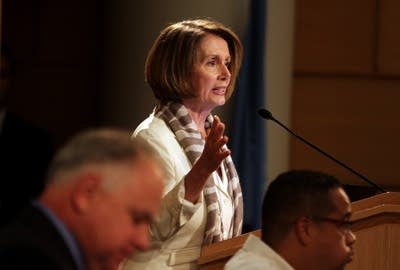U.S. announces $23 million more in Somali famine aid
Go Deeper.
Create an account or log in to save stories.
Like this?
Thanks for liking this story! We have added it to a list of your favorite stories.

The U.S. government will send an additional $23 million for famine relief in the Horn of Africa, it was announced Wednesday in a panel that included House Minority Leader Nancy Pelosi.
The head of U.S. Agency for International Development, Raj Shah announced the increased aid at the University of Minnesota's Humphrey school during a panel that discussed famine and poverty in Somalia.
More than 30,000 children under the age of 5 have died in Somalia, Shah said. Epidemiologists believe the number of deaths will rise significantly if aid groups aren't able to expand their access to vulnerable populations in Somalia, he added.
"That's why today I'm happy to announce a new package of over $23 million in grants and support that the United States will provide," Shah said.
Turn Up Your Support
MPR News helps you turn down the noise and build shared understanding. Turn up your support for this public resource and keep trusted journalism accessible to all.
The panel took written questions from the audience of about 200 people. One pointed out that humanitarian groups' efforts are held back by the United States' anti-terrorism laws. Much of Somalia is controlled by the terrorist designated group al-Shabaab.
"President Obama has made the determination that we would offer a waiver on certain of those restrictions to organizations working to alleviate the humanitarian crisis during this famine," Shah said. "As a result, I can say today that any partner that's working with the U.S. government, or U.S. AID in particular, will be immune to prosecutions."
Another asked the panelists to explain how the U.S. helped cause the situation in Somalia.
Panel moderator and 5th District congressman, Keith Ellison, responded U.S. policy still is shadowed by the incident known by the shorthand, Black Hawk Down.
"I think ever since 1993, after the US went to Somalia, we got into this thing with Mohamed Farrah Aidid, and ended up having the 'Black Hawk Down' incident," Ellison said, referring to the 1993 battle involving U.S. forces in Mogadishu. "And I think that ever since that time there has been somewhat of a reluctance and a lack of understanding about what we should do."
Ellison called it "benign neglect." He said neglecting Somalia will never lead to a solution. The DFL congressman said the U.S. must support a strong government that will administrate in Somalia, rather than rely on an expatriate Somali community that attempts to effect change remotely from bases in Kenya.
After the panel discussion, Somali American Farhio Khalif of Minneapolis pointedly asked Pelosi, "What is Obama's administration doing to establish real government going on in our country, Somalia?"
"It's a long history and a path we have to see our way out of," Pelosi said. "What we talked about today relates to feeding people, giving them an act of friendship that hopefully supports the democratic efforts in Somalia."
Khalif, who is launching an Internet site focused on Somali women, said she was satisfied with Pelosi's answers.
"We always have questions," Khalif said. "Anytime we get any answer from the U.S. government, the State Department, or any administration (official), it's great. It's one step closer."
Attention from important officials sent the right message about the urgent need to help people in Somalia, said Jaylani Hussein, a board member for the American Relief Agency for the Horn of Africa.
"The talk is great. And we welcome it," Hussein said. "And we're looking forward to more bigger, more presentations and more discussions about the issues that are causing these famines. But at the same time we're calling for action."
Dear reader,
Political debates with family or friends can get heated. But what if there was a way to handle them better?
You can learn how to have civil political conversations with our new e-book!
Download our free e-book, Talking Sense: Have Hard Political Conversations, Better, and learn how to talk without the tension.






